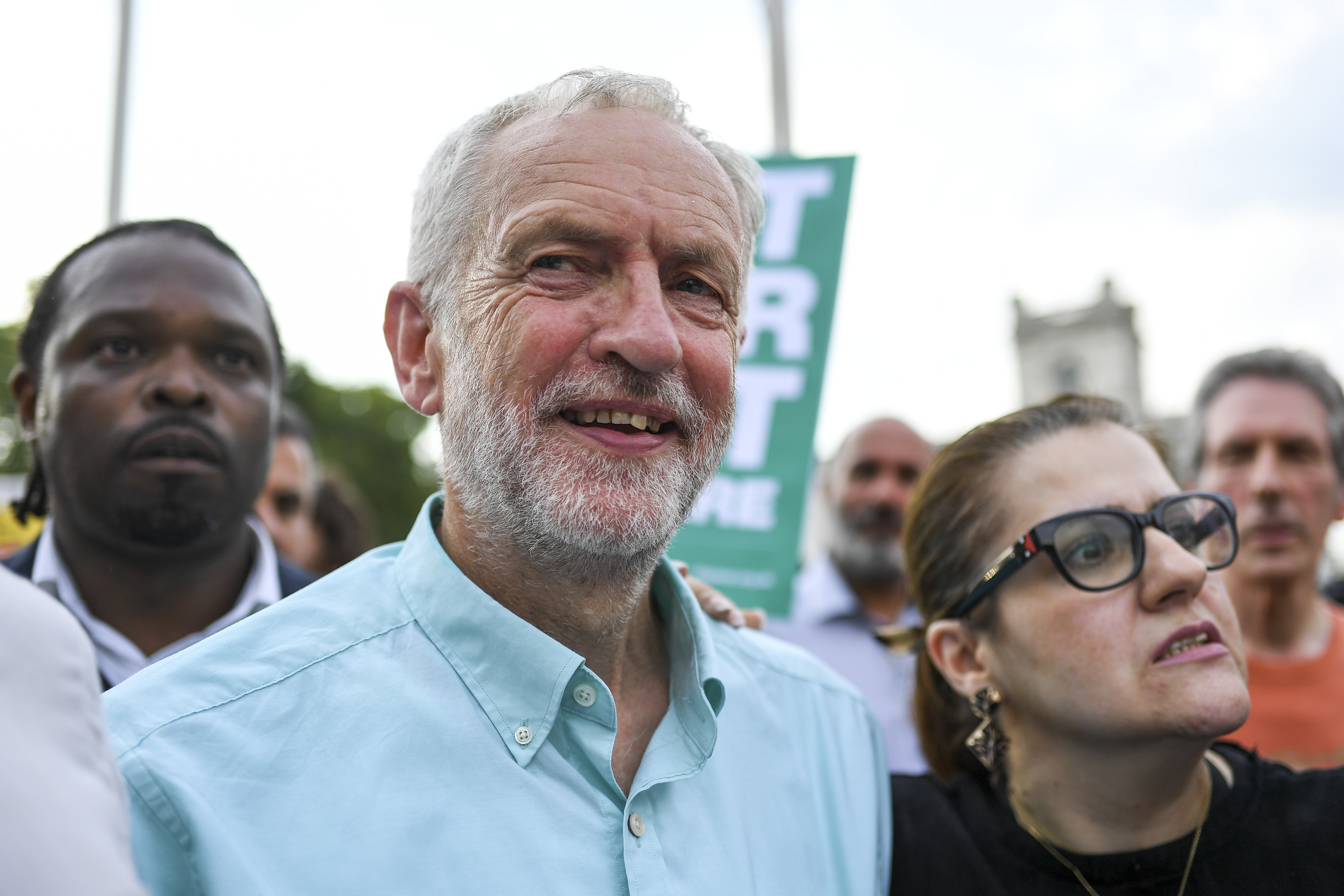
Britain's Labour Party leader Jeremy Corbyn (L, front) attends a rally at the Parliament Square, calling for a general election, in London, Britain, on July 25, 2019. (Photo: Xinhua)
Prime Minister Boris Johnson has thrown down the gauntlet to parliament by declaring that Britain will leave the EU on Oct. 31 under the Brexit arrangement come what may.
In response, Labor leader Jeremy Corbyn hopes to bring down Johnson's Conservative (Tory) government. To this end, he addressed a letter to the leaders of other opposition parties, as well as to a number of prominent Tory MPs opposed to a no-deal Brexit offering himself as an alternative.
He would table a motion of no confidence in the government when parliament reassembles on Sept. 3. If this passes, parliament has 14 days to form a new government, which Corbyn would seek to lead as head of the largest opposition group.
This would be an interim, short-term administration, whose mission would be to seek yet another extension of the EU's deadline on leaving, and then call an election. Corbyn has promised that, if successful, Labor will reopen negotiations with the EU and then call a confirmatory public referendum, including an option to scrap Brexit.
So far, the Scottish Nationalists (SNP), the Welsh Nationalists (Plaid Cymru), and the Greens have declared support for Corbyn's proposal. However, the Liberal Democratic Party, various independent MPs, and rebel Tories, have rejected it .
Newly-elected LibDem leader Jo Swinson initially vehemently opposed Corbyn entering 10 Downing St, even if only for a few months. She insisted Corbyn was too divisive a figure unable to win over enough Tory MPs to secure a majority in the House of Commons.
She called instead for Ken Clarke (Tory) or Harriet Harman (Labor) to form a temporary government, arguing they have a broader appeal in parliament. However, she has since said she was willing to talk to Labor.
The main appeal of LibDems since the 2016 Brexit referendum has been as vociferous opponents of leaving the EU. They have been prominent in numerous demands for a new referendum – the so-called "People's Vote" campaign, which hopes to overturn the earlier result.
In May, elections for the European Parliament showed how polarized British public opinion was, dominated by Brexit. On one side, the newly-formed Brexit Party won the largest share of the vote (31.6%), while the LibDems gained 20.3%.
A poor showing by the Tories – 9.1% – forced Theresa May from office, leading to the Tory leadership contest that brought Boris Johnson to power. Johnson's do or die approach to leaving the EU on Oct. 31 aims to win back support from Brexit Party voters and revive Tory fortunes; opinion polls suggest this approach is working.
The LibDem vote share surpassed Labor's 14.1%, allowing the party to take over leadership of the anti-Brexit fight.
However, parliament only has two options to stop a no-deal Brexit on Halloween: bring down the government and elect another, or attempt to introduce emergency legislation to prevent it.
The Labor leader's proposal was an astute political chess move. It exposed the hollowness of LibDem hostility as voters will rightly ask: If a no-deal Brexit can only be prevented by backing a Corbyn-led temporary caretaker government why on earth are you opposed to this?
It is certainly true that the parliamentary arithmetic for Corbyn's move does not look promising, even though Johnson has a paper-thin parliamentary majority of one. This is because some Labor MPs are Brexiteers, so maybe as many as 10 Tory MPs would have to vote with the Labor Party to be able to oust Johnson and form a new government.
Anyone who do so will be forced out of the Tory Party. And, even if the LibDem Party was to back Corbyn's proposal, other independent MPs, most of whom left the Labor Party during the current parliament, are repelled by Corbyn taking the party far to the left.
However, parliament has on three occasions voted to oppose a no-deal Brexit. So, although, officially, Boris Johnson is pushing hard for a no-deal, he is simultaneously running an undeclared election campaign.
He expects that parliament will try to thwart a no-deal Brexit by one means or another. If so, he will call an Election claiming to represent the people (pro-Brexiteers) against parliament. There is little doubt that Britain faces a dramatic period of parliamentary and constitutional upheaval.
Corbyn's leadership of the Labor Party has been much maligned and attacked, not least by his own MPs. His rise to prominence in 2015, when he won the Party leadership election by a thumping majority, was totally unexpected.
He has consistently beaten the odds by going among the people – campaigning is his natural habitat. Johnson is well aware that, in the last General Election in 2017, Labor started the campaign with a 28% approval rating, yet weeks later it took 40%. Even though the momentum is on Johnson's side, anyone who writes off Corbyn would be foolish.
Heiko Khoo is a columnist with China.org.cn. For more information please visit:
http://china.org.cn/opinion/heikokhoo.htm
Opinion articles reflect the views of their authors, not necessarily those of China.org.cn.


